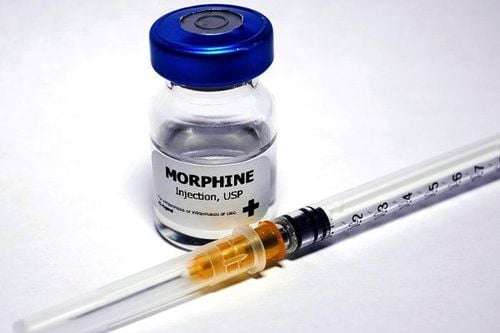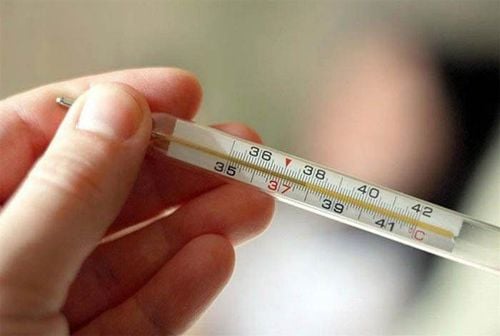This is an automatically translated article.
Infectious mononucleosis caused by the Epstein-Barr virus causes symptoms such as fatigue, fever, sore throat, and enlarged lymph nodes. Diagnosis is based on clinical symptoms combined with EBV serological testing. Treatment of mononucleosis is primarily supportive care and corticosteroids.
1. Diagnosis of infectious mononucleosis
1.1 Diagnosis is based on clinical signs and symptoms
Infectious mononucleosis syndrome is diagnosed based on typical symptoms and signs including:
Allergic pharyngitis : can be severe, painful, sweaty and may resemble Streptococcus pharyngitis . Fever: usually high in the afternoon or early evening, with a temperature of about 39.5 degrees Celsius and can reach 40.5 degrees Celsius. Enlarged lymph nodes: usually symmetrical and involve any group of nodes, especially the anterior and posterior cervical ganglia. Convulsions Mild hepatomegaly and painful percussion. Edema around the eye sockets and roof of the mouth. Rarely papules Splenomegaly : occurs in about 50% of cases.
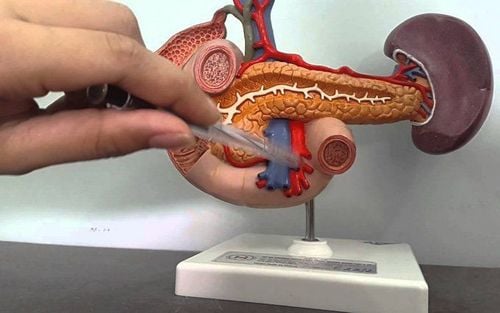
Lách to là một biểu hiện của hội chứng tăng bạch cầu đơn nhân nhiễm khuẩn
1.2 Diagnosis based on laboratory tests
Laboratory tests indicated in the diagnosis of infectious mononucleosis include:
Heterophile antibody test: measured by different agglutination tests. However, only 50% of patients with disease less than 5 years have heterophile antibodies, and approximately 80-90% of adolescents and adults have infectious mononucleosis. In addition, the heterophile antibody test may be falsely positive in some patients with acute HIV infection, and the titer and appearance of antibodies increase during the 2nd and 3rd week of illness. Therefore, if the diagnosis is in doubt but the heterophile antibody test is negative, the test should be repeated after 7-10 days. EBV serology: presence of IgM antibodies to viral surface antigen indicates primary EBV infection, but these antibodies persist for life. Antinuclear EBV antibodies develop later, during acute EBV infection, and also persist for life. If EBV antibody titers are negative or infection is present remotely, other tests should be considered.
2. Differential diagnosis of infectious mononucleosis with other diseases
2.1. Differential diagnosis with acute HIV infection
Infectious mononucleosis may present with clinical signs similar to primary HIV infection. If the patient has risk factors for HIV infection, the differential diagnosis should be performed with the following tests:
Measurement of HIV viral load in the blood Antibody and antigen immunoassay P24 HIV test ELISA / test technique Western blot tests are usually negative during acute infection. Therefore, this test should not be used alone for the diagnosis of early HIV. Because HIV RNA and P24 antigens are present in the blood before HIV antibodies develop, an acute HIV infection is more diagnostic with HIV and P24 antigen measurements.
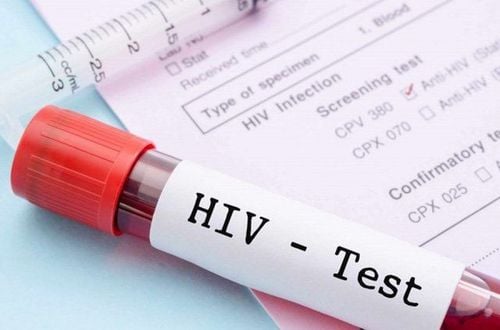
Kết quả xét nghiệm HIV ELISA có thể bị ảnh hưởng bởi bệnh tăng bạch cầu đơn nhân nhiễm khuẩn
2.2. Differential diagnosis of cytomegalovirus infection
Cytomegalovirus (CMV) infection can cause a syndrome similar to infectious mononucleosis. Cytomegalo infection usually does not cause acute pharyngitis, but causes atypical lymphocytosis, hepatomegaly, and splenomegaly, and even leads to hepatitis.
2.3. Differential diagnosis with Toxoplasma infection
Toxoplasmosis can cause symptoms similar to infectious mononucleosis such as fever and lymphadenopathy but usually without pharyngitis.
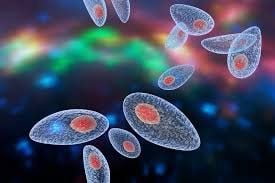
Hình ảnh ký sinh trùng Toxoplasma
3. Treatment of infectious mononucleosis syndrome
Infectious mononucleosis syndrome can resolve on its own, but in some cases it can lead to dangerous complications such as airway obstruction, splenic rupture, and sometimes neurological syndrome. The duration of the acute phase change disease can be as long as 2 weeks. Overall, about 20% of patients are able to work and study after 1 week of illness and the remaining 50% after 2 weeks. Fatigue can persist for weeks or even months.
Therefore, the mainstay of treatment for infectious mononucleosis is supportive care and the use of corticosteroids. Patients are encouraged to rest during the acute phase, when symptoms such as fever, sore throat and fatigue are present. In addition, to prevent splenic rupture, patients should avoid exercise or vigorous sports activities for 1 month after detection until symptoms of splenomegaly subside.
Besides, corticosteroids help relieve sore throat, reduce fever, but should not be used in case of uncomplicated disease, abuse will cause many unwanted effects. Corticosteroids can be used and effective in cases of complications such as: severe thrombocytopenia, risk of airway obstruction, hemolytic anemia,...
In summary, leukocytosis infectious mononucleosis caused by the Epstein-Barr virus. Patients present with symptoms of fatigue, fever, sore throat and enlarged lymph nodes. Fatigue can last for weeks or even months. If not diagnosed and treated, the disease can cause serious complications such as airway obstruction, splenic rupture, and sometimes neurological syndrome. The diagnosis of infectious mononucleosis is based on clinical symptoms and EBV serology, and the mainstay of treatment is supportive care.
Currently, Vinmec International General Hospital has been and continues to be fully equipped with modern diagnostic facilities such as: PET/CT, SPECT/CT, MRI... biology, immunohistochemistry, genetic testing, molecular biology tests, blood tests to diagnose diseases, including infectious mononucleosis syndrome.
After having an accurate diagnosis of the disease, the stage, the patient will be consulted to choose the most appropriate and effective treatment methods. The treatment process is always closely coordinated with many specialties: Diagnostic Imaging, Biochemistry, Immunology, Cardiology, Stem Cell and Gene Technology; Department of Obstetrics and Gynecology, Department of Endocrinology, Department of Rehabilitation, Department of Psychology, Department of Nutrition... to bring the highest efficiency and comfort to patients. After going through the treatment phase, the patient will also be monitored and re-examined to determine whether the treatment is effective or not.
Please dial HOTLINE for more information or register for an appointment HERE. Download MyVinmec app to make appointments faster and to manage your bookings easily.







